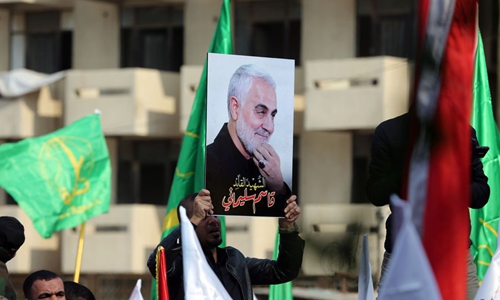Iran fired a dozen missiles at two Iraqi air bases housing US forces early Wednesday in retaliation of the US killing its top military general Qassem Soleimani.
It’s difficult to tell how this tit-for-tat cycle will end, but one thing is for sure: The Middle East will become even more unstable this year. China’s ability to maintain stability and development momentum will be tested amid turbulence created by the US in the Middle East.
What do escalating US-Iran tensions mean to China? In the wake of the US drone strike that killed Soleimani, there is a view that if the US is dragged into a war with Iran in the Middle East, this will relieve some US pressure on China, and as a result, being strategically good for China. Such a view is simplistic.
Ann Lee, an American author and media commentator, argued in an op-ed in the South China Morning Post Tuesday that the US assassination of Soleimani “is a carefully calculated provocation of China” and “all the war games in the Pentagon have been against China, not Iran or Russia”. Her view deserves particular attention. Her analysis cautions that when the US views China as a major rival, the China factor weighs in Washington’s foreign policy.
China must clearly bear this in mind – the US is adept at creating trouble in China’s peripheral region or areas where China has great interests. Its aim is to thwart China’s development by implicating China or even dragging China into military clash. The US-Iran conflict fits into this tactic because China has big and growing reliance on energy from Iran and other Mideast countries, which makes it vulnerable to regional strife and turbulence.
The US has defined China as its “strategic competitor.” Most analysts in Washington believe China poses the biggest threat to US global supremacy.
Therefore, Washington has launched an all-around offensive against Beijing on economy, technology and finance, and the China factor has been taken into consideration when the US maps out any foreign policy strategy.
China must see through the US’ real intention of escalating tensions with Iran and messing up the Middle East. China has urged calm as geopolitical tensions escalate in the Middle East, which shows it’s a responsible power. Beijing is making great efforts in maintaining domestic stability and development while playing a constructive role in stabilizing the region and world.
Year 2020 is widely believed to be another turbulent year. In its newly released “Top Risks 2020” report, the Eurasia Group, a political risk research and consulting firm, listed the top 10 risks for 2020. The list includes US domestic politics, China-US decoupling, tensions with Iran and the Middle East, and Latin America’s instability.
Given the many uncertainties in the world, the most pressing task for China is to maintain stability. One reason for the steady development of China in the past four decades is that China has basically maintained long-term social stability and not engaged in foreign wars. Although challenges have grown, China must overcome them and stick to the path of peaceful development.
A group of mourners holding pictures of top Iranian commander Qassem Soleimani in Baghdad, Iraq on Saturday. Photo: Xinhua/Khalil Dawood



